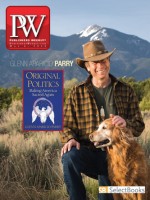Journalist Hamby’s Soul Full of Coal Dust (Little, Brown, Aug.) examines the resurgence of black lung disease.
Did growing up in the South encourage your interest in this story of Appalachia?
Not directly, but the fact that my father’s family has lived in the rural South for generations laid a foundation for my interest, so I was receptive to the story when I encountered it. At the nonprofit Center for Public Integrity, I was on a team covering stories about the environment, labor, and public health. When I came across this one, I couldn’t look away.
What made you decide to expand your original reporting on coal miner Gary Fox’s fight to receive compensation and health benefits for advanced-stage black lung disease into a book?
I felt lucky to be given 28,000 words for this story at the Center, but felt I had told just a small sliver of it, and welcomed the opportunity to present the longer history. When the articles were published, the story wasn’t done; Gary’s benefits decision had been reversed, [his lawyer] John Cline was appealing the decision, and Johns Hopkins Hospital’s radiologists were still reading X-rays for coal companies.
Why do you think some radiologists at Hopkins were so willing to help coal companies avoid paying benefits to miners?
The issue was with a small unit whose activities were unknown to most hospital employees, but which was able to have an outsize impact on the cases of thousands of miners, due to the volume of X-rays it read. In this group, individual personalities—such as that of its leader, Dr. Paul Wheeler, who had worked there for four decades—came to the fore. Its work reflected his approach to reading X-rays.
What is the main thing you hope readers will take away from the book?
Americans owe a deep debt to people doing some of the hardest work imaginable, work that powered the U.S., and we have a duty of care to them. We need to have a serious and realistic conversation about what the future might look like for ex-industrial communities—this can’t be just a small initiative like teaching former miners to code. It’s easy to lose faith in people and institutions, but I saw remarkable change occur because of a small number of ordinary people’s activity over the long term. Most people who work in public service are in it for the right reasons, and can do things that help average people.
Have you stayed in contact with the people you met in the course of your research?
Yes. Having an excuse to keep in touch was one of the best parts of writing the book.



 Volume 267
Issue 18
05/04/2020
Volume 267
Issue 18
05/04/2020





